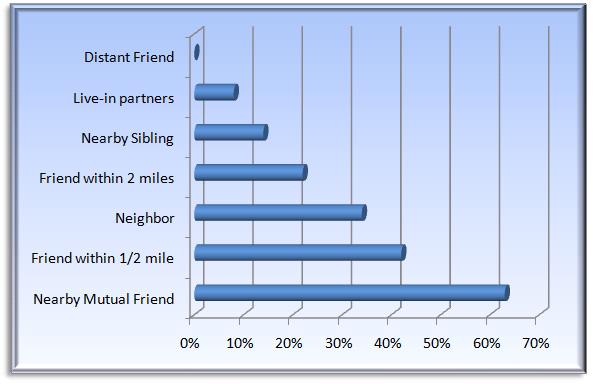How contagious is happiness? Very. Research by Harvard Medical School and the University of California found happiness is like a virus – it’s passed through social networks, such as family, close friends and neighbors. Sadness, however, does not apparently spread to the same extent.
The study examined the happiness of nearly 5000 people in the Framingham Heart Study for over 20 years. It found that a person’s happiness starts a chain reaction that helps their friends, their friends’ friends, and their friends’ friends’ friends. So your happiness can be affected by people you don’t even know. Amazingly, the effects can apparently last for up to a year, but do decay over time and with geographical separation.
How does happiness spread? The study researchers are unsure, but one way might be because happy people spread their good mood by being generous with their time and money. Interestingly, the researchers believe face-to-face contact is important for the happiness to spread.
Geographic closeness of friends affects happiness
The closer a friend lives to you the more likely they are to pass on their happiness, according to researchers. They say a happy friend living within half a mile from you means that there’s a 42% chance of them making you happier. The same friend living two miles away only has a 22% chance. The researchers claim that distant happy friends do not affect your happiness.
A similar finding occurred for siblings, next door neighbors and partners. They said a happy next door neighbor, for example, has a 34% chance of making you happier. A happy spouse has an 8% chance.
Interestingly, happiness was not found to be passed on among co-workers.
Table: Study findings of the chance that a happy person you know will make you happier

Happiness spreads up to three degrees of separation
The study found that a happy person can affect the happiness of others indirectly via other people.
Researchers measured the impact up to three degrees from the happy person. They say that a happy person can trigger a chain reaction that benefits their friends (42%), their friends’ friends (10%), and their friends’ friends’ friends (5.6%). If this is correct, this means that your happiness depends, in part, on the emotional experiences of people you may never even know.
Clusters of happiness
The study noticed that happy and unhappy people tend to live in clusters. The researchers believe that these clusters occur because happiness spreads, and not just because of a tendency for people to associate with similar people. The happiest people tend to be at the center of large social networks, so when you are surrounded by happy people they are likely to make you happy too.
“Although we are connected with friends and family members who live far away via cellphone and the Internet, these results indicate that there is nothing like a face-to-face interaction,” Oishi said. “We are told to get connected by cellphone companies, but in order to get connected you really have to live close by and interact face-to-face.”
The researchers conclude that all people belong to social networks and our happiness affects the happiness of those close to us. So to boost your happiness, have plenty of face-to-face contact with positive happy people.
Comments
It’s important to note that study participants were asked only four questions to measure their happiness. This was done by finding how often they felt certain feelings during the previous week. The questions were: “I felt hopeful about the future”, “I was happy”, “I enjoyed life”, and “I felt that I was just as good as other people”.
A “perfect score” was required for all of the questions in order for a participant to be labelled as happy. The researchers claim this is a valid test for happiness, but this seems simplistic to me. Questions spring to mind, such as “What if someone had a “perfect score” for three out of the four questions? Can’t they still be reasonably happy?”
The study found happiness didn’t spread among co-workers. This appears odd – and I don’t really believe it – because many of us spend more time and have more face-to-face contact with our co-workers than our family and friends. Why do many companies spend money to boost employee health, happiness and relations by having, for example, workplace health promotion programs and employee social outings? Research has found that happy and healthy employees are more productive employees that have less sick days than their less healthy and less happy counterparts.
I also don’t believe that distant happy friends don’t make us happy. If we have a happy conversation on the phone with them or just remember happy memories we shared with them, we can boost our happiness.
written by Nyomi Graef
References:
Fowler, JH et al., 2008, Dynamic spread of happiness in a large social network: longitudinal analysis over 20 years in the Framingham Heart Study, British Medical Journal, 337, a2338,
http://www.bmj.com/content/337/bmj.a2338
Kaplan, K, 2008, Your whole world smiles with you, Los Angeles Times,
http://articles.latimes.com/2008/dec/05/science/sci-happy5
Rodi, A, 2008, Science Tech, The Daily Free Press,
http://dailyfreepress.com/2008/12/09/science-tech/
Smith, R, 2008, Happiness is ‘infectious’ and spreads through friends and family, The Telegraph,
http://www.telegraph.co.uk/health/healthnews/3548303/Happiness-is-infectious-and-spreads-through-friends-and-family.html

 August 20th, 2009
August 20th, 2009  Nyomi Graef
Nyomi Graef  Posted in
Posted in 

Happiness should be found inside us not from outside or from others